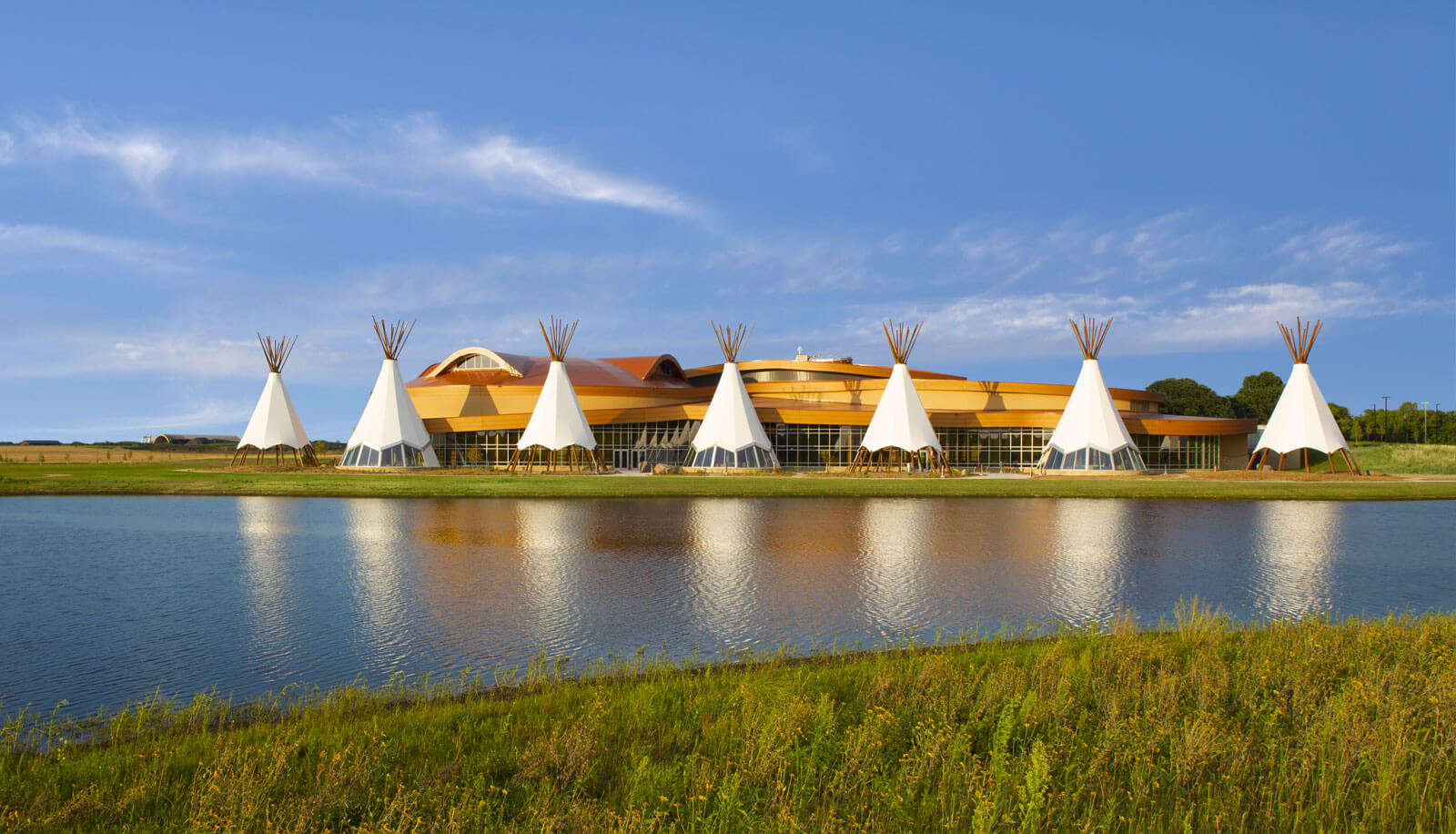
- Details
- By Native News Online Staff
The Institute of Museum and Library Services (IMLS) announced on Wednesday, March 27, 2024, that Hoċokata Ṫi (pronounced ho-cho-kah-tah-tee), the Shakopee Mdewakanton Sioux Community (SMSC)’s cultural center, is among 30 finalists for the 2024 National Medal for Museum and Library Service.
Hoċokata Ṫi is the only Native American institution and the only institution in Minnesota to be selected as a finalist for this award.
The National Medal is the nation’s highest honor given to museums and libraries that demonstrate significant impact in their communities. For 30 years, the award has honored institutions that demonstrate excellence in service to their communities.
Hoċokata Ṫi, which means the “lodge at the center of the camp” in Dakota, opened in 2019 to support the SMSC’s preservation efforts. Its mission is to interpret and encourage Mdewakanton Dakota cultural heritage, language and history by sustaining this inherent knowledge through exhibitions, preservation and education.
“Hoċokata Ṫi’s programming has been very meaningful to our tribe, offering a place to gather, connect and learn – all centered around preserving our history and culture for future generations,” SMSC Chairman Cole Miller said. “We are honored to be among the finalists for this award from the Institute of Museum and Library Services. This recognition is a true testament to the incredible staff at Hoċokata Ṫi – many of whom are tribal members – who are dedicated to sharing our story.”
Every aspect of Hoċokata Ṫi – its education classes, public exhibit and building design – honors Mdewakanton Dakota culture. It provides a space for tribal members to practice cultural activities and encourage the passing down of knowledge. It also invites the broader community to learn about the tribe and its culture and history through its 3,805-square-foot public exhibit, called “Mdewakanton: Dwellers of the Spirit Lake.”
Thousands of individuals, as well as hundreds of educators and students, senior groups, and professional organizations, have participated in programming at Hoċokata Ṫi. Its staff have developed resources for educators, including professional development sessions in cultural competency, tribal narratives and integrating Indigenous perspectives.
“The 30 National Medal finalists from across the United States showcase the tremendous abilities of libraries and museums to serve as trusted, dynamic public spaces that meet the needs of their communities,” said IMLS Acting Director Cyndee Landrum. “The Institute of Museum and Library Services is honored to recognize these outstanding institutions. We congratulate them on their collective effort to respond to community needs, preserve diverse history and culture, and create a sense of belonging for all Americans.”
National Medal winners will be announced in late May. Representatives from winning institutions will be honored for their extraordinary contributions during an in-person National Medals Ceremony in Washington, D.C., this summer.
To see the full list of finalists and learn more about the National Medal, visit the IMLS website.
Hoċokata Ṫi is located at 2300 Tiwahe Cir, Shakopee, Minnesota 55379
More Stories Like This
Chickasaw Artists Represent at Southwestern Association for Indian Arts in Santa FeZuni Partners Share Community-Led Delapna:we Project at ATALM 2025 Conference
Celebrating 50 Years: The Rockwell Museum Looks to the Future with "Native Now"
AMC Announces Return of Dark Winds for Season 4, Premiering February 15
Film featuring Teyton Colbert to hit theaters in November
Help us tell the stories that could save Native languages and food traditions
At a critical moment for Indian Country, Native News Online is embarking on our most ambitious reporting project yet: "Cultivating Culture," a three-year investigation into two forces shaping Native community survival—food sovereignty and language revitalization.
The devastating impact of COVID-19 accelerated the loss of Native elders and with them, irreplaceable cultural knowledge. Yet across tribal communities, innovative leaders are fighting back, reclaiming traditional food systems and breathing new life into Native languages. These aren't just cultural preservation efforts—they're powerful pathways to community health, healing, and resilience.
Our dedicated reporting team will spend three years documenting these stories through on-the-ground reporting in 18 tribal communities, producing over 200 in-depth stories, 18 podcast episodes, and multimedia content that amplifies Indigenous voices. We'll show policymakers, funders, and allies how cultural restoration directly impacts physical and mental wellness while celebrating successful models of sovereignty and self-determination.
This isn't corporate media parachuting into Indian Country for a quick story. This is sustained, relationship-based journalism by Native reporters who understand these communities. It's "Warrior Journalism"—fearless reporting that serves the 5.5 million readers who depend on us for news that mainstream media often ignores.
We need your help right now. While we've secured partial funding, we're still $450,000 short of our three-year budget. Our immediate goal is $25,000 this month to keep this critical work moving forward—funding reporter salaries, travel to remote communities, photography, and the deep reporting these stories deserve.
Every dollar directly supports Indigenous journalists telling Indigenous stories. Whether it's $5 or $50, your contribution ensures these vital narratives of resilience, innovation, and hope don't disappear into silence.
 The stakes couldn't be higher. Native languages are being lost at an alarming rate. Food insecurity plagues many tribal communities. But solutions are emerging, and these stories need to be told.
The stakes couldn't be higher. Native languages are being lost at an alarming rate. Food insecurity plagues many tribal communities. But solutions are emerging, and these stories need to be told.
Support independent Native journalism. Fund the stories that matter.
Levi Rickert (Potawatomi), Editor & Publisher

